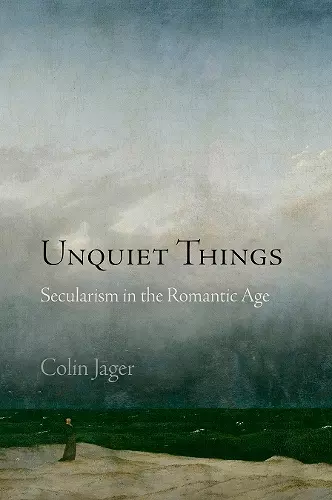Unquiet Things
Secularism in the Romantic Age
Format:Hardback
Publisher:University of Pennsylvania Press
Published:4th Dec '14
Currently unavailable, and unfortunately no date known when it will be back

Reading works by Austen, Coleridge, Byron, and Shelley among others, Unquiet Things investigates the social and political disorders that arise within modern secular cultures. Jager demonstrates the distinctive ability of literary writing to register the uneasiness and anxiety that characterize the mood of secular modernity.
In Great Britain during the Romantic period, governmental and social structures were becoming more secular as religion was privatized and depoliticized. If the discretionary nature of religious practice permitted spiritual freedom and social differentiation, however, secular arrangements produced new anxieties. Unquiet Things investigates the social and political disorders that arise within modern secular cultures and their expression in works by Jane Austen, Horace Walpole, Samuel Taylor Coleridge, Lord Byron, and Percy Shelley among others.
Emphasizing secularism rather than religion as its primary analytic category, Unquiet Things demonstrates that literary writing possesses a distinctive ability to register the discontent that characterizes the mood of secular modernity. Colin Jager places Romantic-era writers within the context of a longer series of transformations begun in the Reformation, and identifies three ways in which romanticism and secularism interact: the melancholic mood brought on by movements of reform, the minoritizing capacity of literature to measure the disturbances produced by new arrangements of state power, and a prospective romantic thinking Jager calls "after the secular." The poems, novels, and letters of the romantic period reveal uneasy traces of the spiritual past, haunted by elements that trouble secular politics; at the same time, they imagine new and more equitable possibilities for the future. In the twenty-first century, Jager contends, we are still living within the terms of the romantic response to secularism, when literature and philosophy first took account of the consequences of modernity.
"This is an impressively researched study of the interplay of history, religion, politics, culture, and literature from the sixteenth to the nineteenth century. It is also a vigorously engaged intervention in these matters as they continue to play out in our own day." * Edward Duffy, Review 19 *
"Through a wonderful set of readings, Colin Jager makes vital claims about secularity and the specters that haunt it-in literature, and perhaps in the very articulation of the literary itself." * Amy Hollywood, Harvard Divinity School *
ISBN: 9780812246643
Dimensions: unknown
Weight: unknown
344 pages